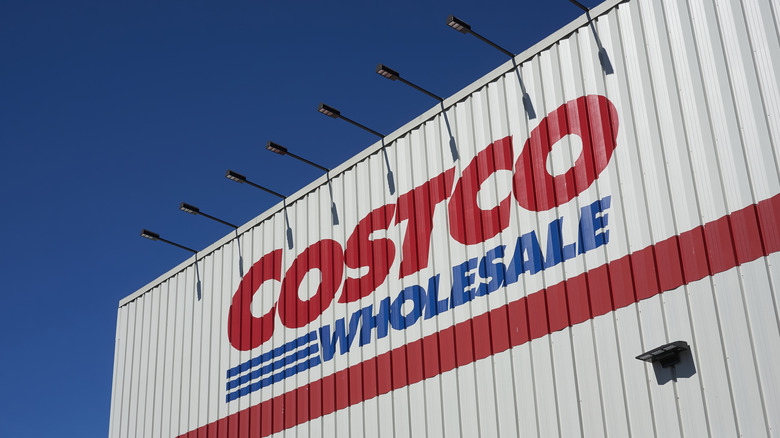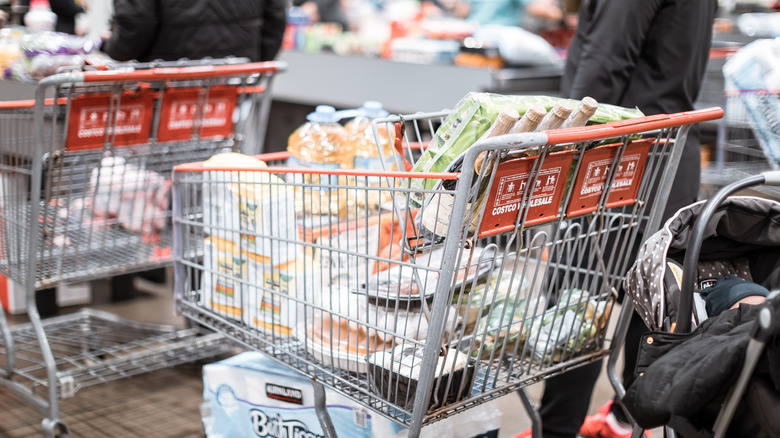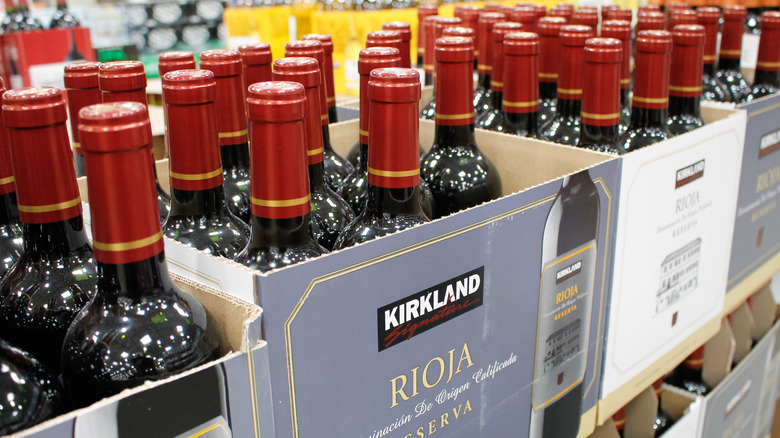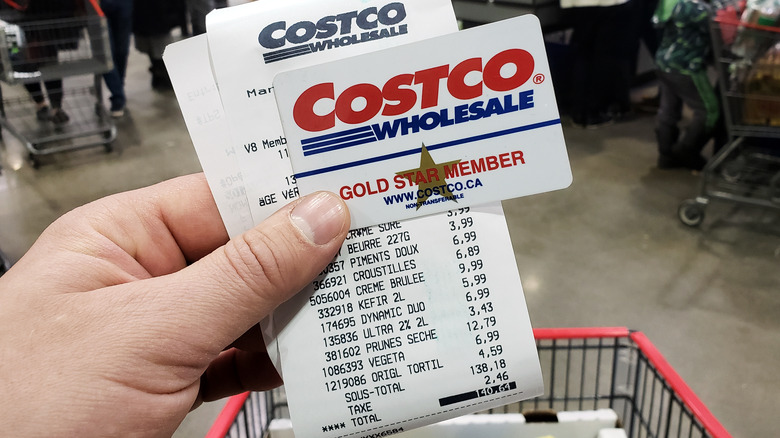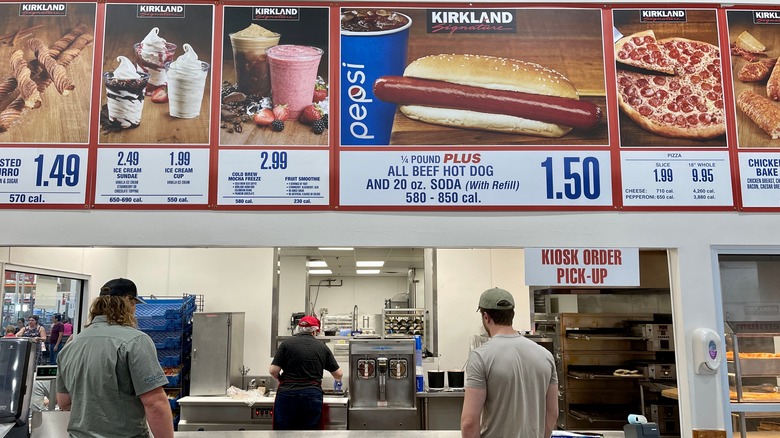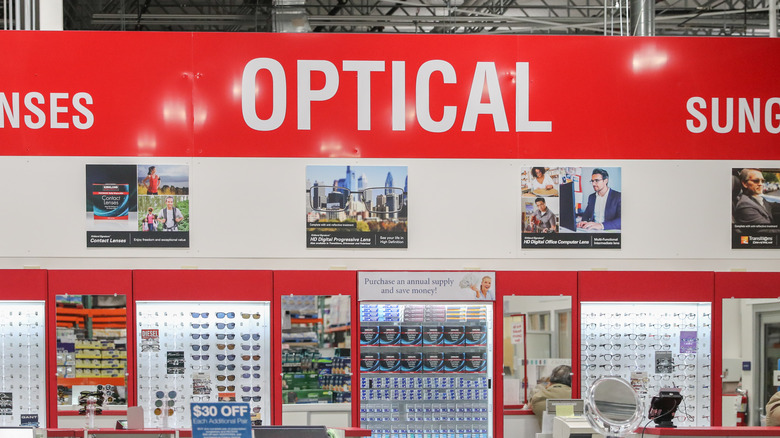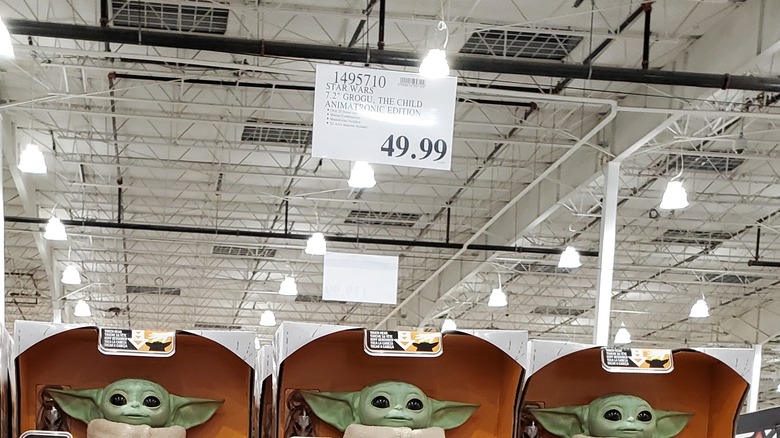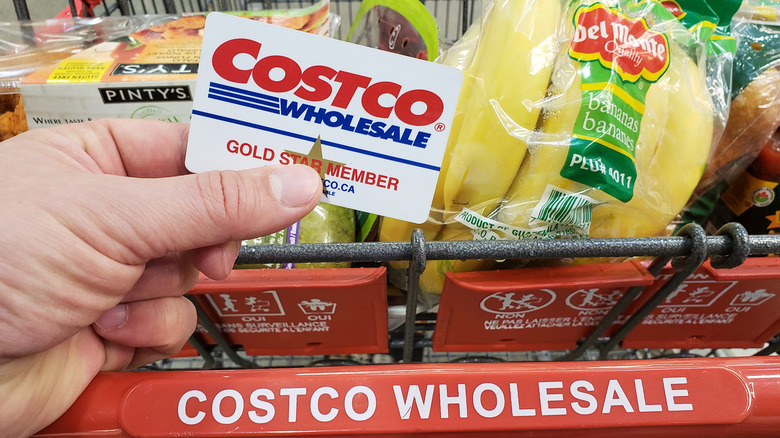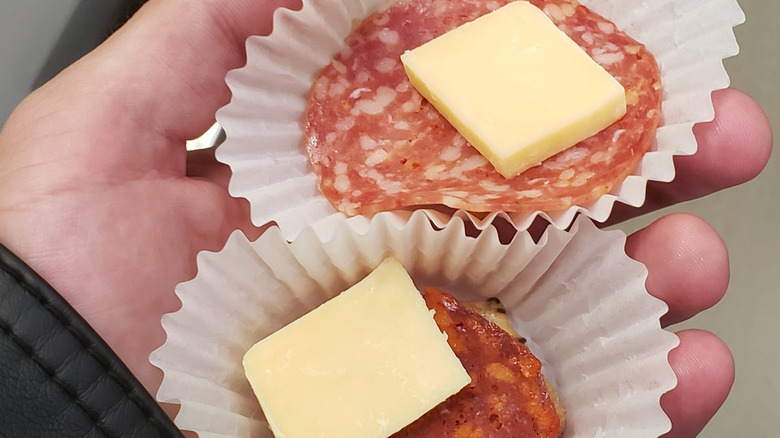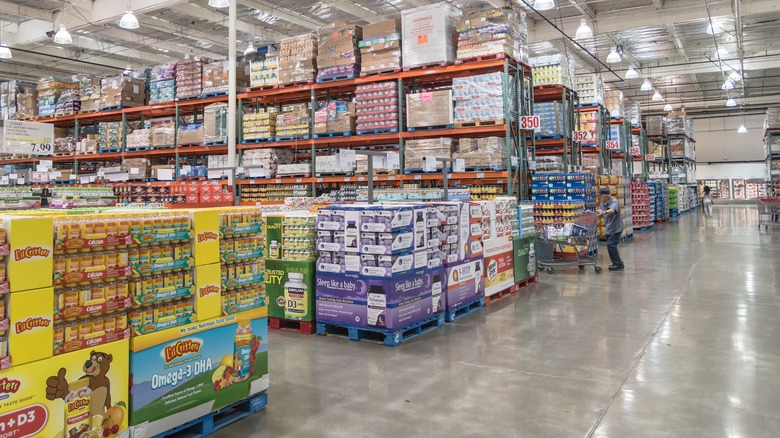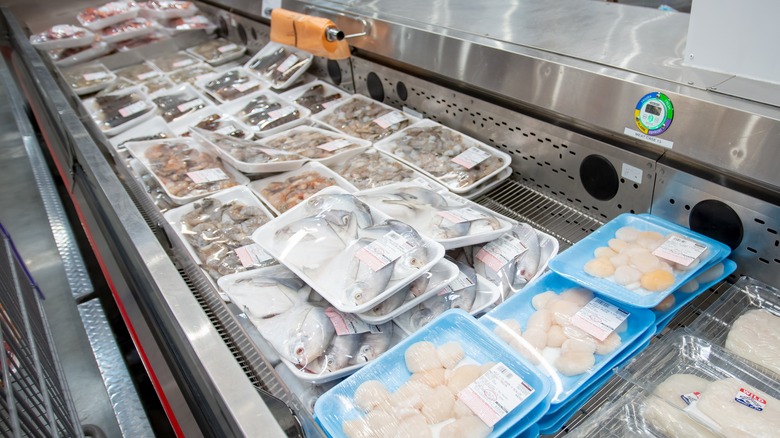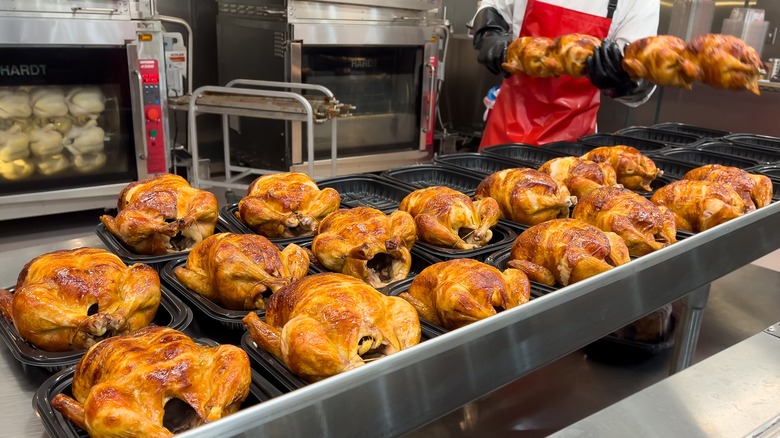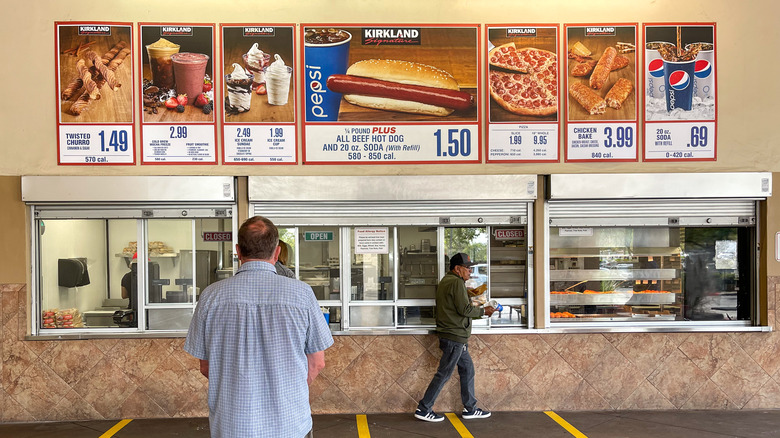Costco Myths You Should Stop Believing
Costco has a devoted following, and with good reason. From serving delicious pizza and perpetually cheap hot dogs to being almost a one-stop shop for everything you need, the retail company offers so many products that you can literally wander its stores' aisles for hours. Interestingly, there's no shortage of myths about the mega-popular chain that definitely require some debunking.
It's not unusual to find that a myth about Costco actually has a basis in fact and is semi-true. For example, the myth might discuss an actual phenomenon at the store, but attribute it to the wrong reason. There are also myths that used to be true before a change in policy. When you have such a large and loyal membership base watching your every move, it's very easy for a simple issue to spiral into a legend. Whether you're a new Costco member or a seasoned shopper who watches store activities like a hawk, these myths can trip you up when you least expect them to. You don't want your next trip to Costco to be ruined by one of these mistaken ideas, so that's why we're taking a look at Costco myths you should stop believing.
Let the Costco cashiers remove items from your cart
Costco's checkout procedure can be overwhelming when you have several heavy items packed into your cart, and a pervasive claim is that you should not take anything out of the cart for the cashier. However, according to Insider, this is mostly a myth.
You should take items out and place them on the belt as you would at a regular grocery store. The one exception is anything that is very heavy or large; that you can leave in your cart. A Costco worker said that the problem is that many stores don't enforce this policy, making work more difficult for cashiers when customers won't place items on the belt.
There are also claims that some warehouses tell customers to leave items in the cart but placed with the barcode up, so the cashier can scan them quickly. Others leave it up to the cashier, but as this Redditor points out, leaving items in the cart makes it easier to miss smaller items and not ring them up.
You can return anything and everything to Costco
Costco's own customer service website calls its return policy a "risk-free 100% satisfaction guarantee," and the store is notorious for accepting some very odd returns. This Reddit thread details some of the weirder Costco returns, including a mattress with urine stains, a 10-year-old boombox, and even a 13-year-old frozen fish. While these are anecdotes, there are enough to show that Costco's return policy is extremely generous. In practice, it certainly looks like you can return anything and everything.
However, Costco itself is clear that there are some items that must be returned sooner than others, and some items that can't be returned at all. For example, most electronics returns must be received within 90 days of the date the customer originally received the item. Diamonds over 1 carat can be returned if the customer provides the gemology paperwork for the diamond, and the item will go through an additional check by a gemologist.
As for items that can't be returned at all: cigarettes and alcohol where prohibited by law, and custom products made to order for the customer. For example, in California, you typically can't return alcohol unless it was deemed unfit for consumption, is spoiled, or was not supposed to be purchased (via Total Wine). During the COVID pandemic, the laws in the state were relaxed, but the prohibitions on alcohol returns have since been reinstated. Despite all that, check out that Reddit thread, and you'll see mentions of alcohol returns (including a wine bottle that was mostly empty).
Those receipt-checkers at the door are looking for shoplifters
Showing your receipt to someone on the way out of a store isn't unusual, and it's often so that the store knows if you're walking out with products that aren't on your receipt. Costco uses their "exit greeters" a little differently than other stores, though. According to Costco's customer service site, those employees are there and marking your receipts to ensure that you were charged properly and not overcharged. The explanation also mentions that it's a way to maintain "accuracy in inventory control," which is vague enough to be interpreted as looking for shoplifting.
However, the general manager of a San Francisco Costco location told SFGate that shoplifting wasn't really a problem. As the article mentions, it's kind of hard to sneak a 75-inch TV out of the store. This Reddit thread also confirms that while the exit greeters occasionally catch items that weren't paid for, a lot of the checks are to make sure the prices are correct and that you have everything that you paid for. As one Redditor wrote, the checks also look for things like gift cards or anything that you have to pick up at a location other than the cashier's lane.
Keep in mind that if you buy a membership at Costco, you're agreeing to unconditional consent regarding searches (via Costco Insider). Unfortunately, people unaware of this agreement have refused to show receipts at the door, and that does allow Costco to revoke your membership (via Oregon Live).
You can eat at the food court without a membership
This used to be somewhat true, but as of 2020, unfortunately, it's become a Costco myth. You used to be able to eat at Costco food courts regardless of whether you had a membership or not, something that was especially easy to do when the food court was located outside. However, Costco started requiring proof of membership to eat at any of their food courts, inside or out, in March 2020. The Instagram account @CostcoDeals first broke the news in February 2020 with a picture of a sign warning customers that they would need a membership to eat at the food court starting on March 16, 2020. Fox Business News confirmed this with Costco and was told by their customer service department that the company already required membership to eat at the food court; they just hadn't enforced it because so many courts were outside.
Both Fox Business News and the Los Angeles Times reported mixed reactions from Costco members on social media. Responses ranged from sadness that a low-cost source of food was being taken away from non-members to glee at the anticipated shorter lines. The Los Angeles Times pointed out that non-members would still be able to purchase alcohol and medications.
You can get glasses at Costco without a membership
Costco's non-grocery departments often allow non-members to make use of those services, making it seem like anything outside the food areas is open to anyone. Many of the services that non-members can access are medical or health-related, including getting prescriptions filled and, before the COVID-19 pandemic, attending free health screenings. If you're a non-member, you can get your eyes checked by an optometrist at a Costco location, but the one service you can't access without a membership is buying glasses and contacts. For that, you need to be a member; you can't even purchase contacts through the company's website without a membership, even though the company normally lets non-members use their online store with a surcharge tacked onto those purchases.
Why the difference, if you can purchase other things like prescriptions without a membership? According to All About Vision, the optometrists you see are independent, rather than Costco employees. You pay them and not Costco for the exam, so you don't need a membership. However, Costco owns the optical centers, making the frames and lenses Costco products that require a membership for purchase. This post on Reddit adds a little more detail, noting that when you pay for the optical products, you pay at a Costco register and not in the optometrist's office.
If the price tag has an asterisk, the product isn't coming back
It is true that if a price tag has an asterisk, the product is on its way out. But this Costco secret is often discussed as if the appearance of an asterisk alone is the final warning, and that's not the case. The asterisk indicates the product is in one of two stages of being discontinued; it's the price of the item that truly shows if the product is about to leave stores. In an Instagram reel, Las Vegas real estate agent Greg Chin shows that the last digit of the price is the clue. If the price tag has an asterisk and ends with an 8, the product is in the first markdown stage, but a tag with an asterisk and a price ending with a 7 means the product is at its lowest price, and that Costco is taking a loss just to move the product off its shelves.
It's a good idea to keep an eye on how the pricing works even if you think you know all the secrets, though. The Sun says that a Costco spokesperson not only previously confirmed that pricing is meant to move inventory along, but they also said that "processes tend to change from time to time." The spokesperson declined to give the Sun more information.
Buying at Costco is way cheaper than shopping elsewhere
When you buy in bulk, you typically pay more up front for products that end up costing less per unit than they would if you bought them in smaller quantities. Over time, you save money that way because you spend less per unit. That is true. But a problem that dogs individual shoppers who aren't splitting the bulk buys with others (or buying them for a large family) makes this normally money-saving tactic a real loser and a myth.
When you buy too much of an item and can't use it all, you lose the money you spent on the items you have to discard. Then you have to buy more later on, and the cycle repeats itself. CNBC says to avoid buying perishable foods at Costco for this reason, and also because some of these foods are available for similar prices at grocery stores. One example CNBC uses is eggs, which are often available for maybe one cent more at a grocery store in more reasonable quantities.
If you think you can avoid this problem by buying only shelf-stable goods, think again. Sapling says buying items like cereal in bulk can lead to waste because the amount of cereal is so great, it could go stale before you can finish it. That makes it harder to make up for the price of the membership, too.
Everyone can get unlimited free samples
If you've ever made a meal out of the free food samples at Costco, the idea of not being able to get unlimited free samples does not sound right. But it's true: While the vendors handing out samples are allowed to give out as many free samples as customers want (and according to CBS News, Costco encourages it), there's one group of people who can't get any samples for a very smart reason.
Children who are not tall enough to see the foods being handed out are not allowed to get samples on their own. The reason, according to a former sample vendor who spoke with Mental Floss, is that the people working the sample stations don't want to aggravate food allergies or sensitivities. Jim, the former vendor, said the rule is not official, but the risk is a real concern. He noted that if the child is unaccompanied but can see the samples, they'll let the child take them, because most kids with food restrictions are aware of what they can't have. If a kid is shorter and can't see what's on the table, the chances that the child is too young to understand what they're eating are greater. He said they use the height of the child to decide, because it's difficult to judge the age of many children.
Costco keeps hiding products so you have to search through the store
This is another one of those myths that is based on a true event: the idea that Costco employees hide products so that customers have to search through the store to find them. The key word here is "hide." According to Paige Saunders, an employee at a Canadian Costco location, products really are moved around, but they're not hidden. She discussed the problem in a YouTube video posted in 2020, saying the company has merchandising teams that go into Costco locations overnight and move products around as a corporate strategy. So, the products are in plain sight, just in a different part of the store. Saunders expressed frustration at the policy because the teams don't warn the retail employees ahead of time, so even the employees have trouble finding items they saw the day before.
Costco puts a less-frustrated spin on the practice, calling it a "treasure hunt atmosphere." In the company's eyes, it's a way for customers to discover new products each time they come to the warehouse to shop, similar to how regular grocery stores rearrange their entire layout to get people to spot new products as they wander the aisles.
Costco is discontinuing its Dungeness crab
People really like to use the idea of Costco discontinuing products to reel in readers. That shouldn't be a surprise, considering how devoted some people can get to this or that product. In this case, an advertisement featured a picture of trays of Dungeness crab, claiming Costco would never sell 24 different items again. Snopes investigated the claim in January 2022 and found the ad led to a multi-page article in a slideshow format (the introduction to which apparently changed the number to 21). None of the pages focused on, or even mentioned, the crab, leading Snopes to proclaim that the initial picture was clickbait.
As Snopes also found, Costco's website continues to advertise Dungeness crab products for sale. As of August 2022, Costco.com shows four different Dungeness crab products for sale, with an additional 10 other crab products available, along with a gift card to a restaurant chain and a crab-shaped plushie toy.
Costco is discontinuing its rotisserie chickens
The discontinuation fun doesn't stop with the crab. Snopes also investigated claims in March 2022 that Costco would stop selling their beloved rotisserie chickens. Again, the culprit was an advertisement claiming Costco would stop selling 24 items, but this time the picture was of the rotisserie chickens. And, as with the Dungeness crab, the ad led to an article claiming that Costco would stop selling either 24 or 21 items, with no mention of the item in the picture in the ad. Snopes was unable to find anything about Costco discontinuing their chickens because, as the website noted, the company never made the claim to begin with.
The rotisserie chickens obviously aren't sold online, but you can bet that if the company did stop selling the rotisserie chickens, the news would be everywhere, not in just one online advertisement. Forbes did report in April 2022 that Costco's chicken operations in Nebraska were hit by bird flu and thus at risk. However, the article noted that losses were not that big, and so far, there have been no other hints that anything might disrupt the company's ability to continue selling the chickens.
Costco is finally raising the price of its $1.50 hot dog combo
This is probably one of the most widespread myths about Costco. The $1.50 hot dog and drink combo is not increasing in price, and if former Costco CEO and founder Jim Sinegal has anything to say about it — which he has — you will not see this price go up. What started this outcry, according to Verify This, was a viral tweet from a Twitter account calling itself Breaking911 but actually using the handle @JohnWRichKid. (In other words, it was not the actual Breaking911 news account.) That didn't stop several verified Twitter accounts from retweeting the "news." Even the House GOP Twitter account quote-tweeted it, of course blaming "Bidenflation."
However, the rumor is just a rumor. The $1.50 hot dog deal is not increasing in price, and as Costco CEO Craig Jelinek told 425Business in 2018, the cost will never go up lest Sinegal kill him. As the story goes, Jelinek told Sinegal that the low price of the combo was not sustainable, and Sinegal responded with an order to Jelinek to figure out a way to not raise the price. This is when, according to Jelinek, Sinegal said "If you raise the effing hot dog, I will kill you." Jelinek noted that the $1.50 price is so closely linked to Costco that it's become a mindset. His solution was to have Costco build its own hot dog processing plant and to use those hot dogs for the combo instead of the previous non-house brand.
